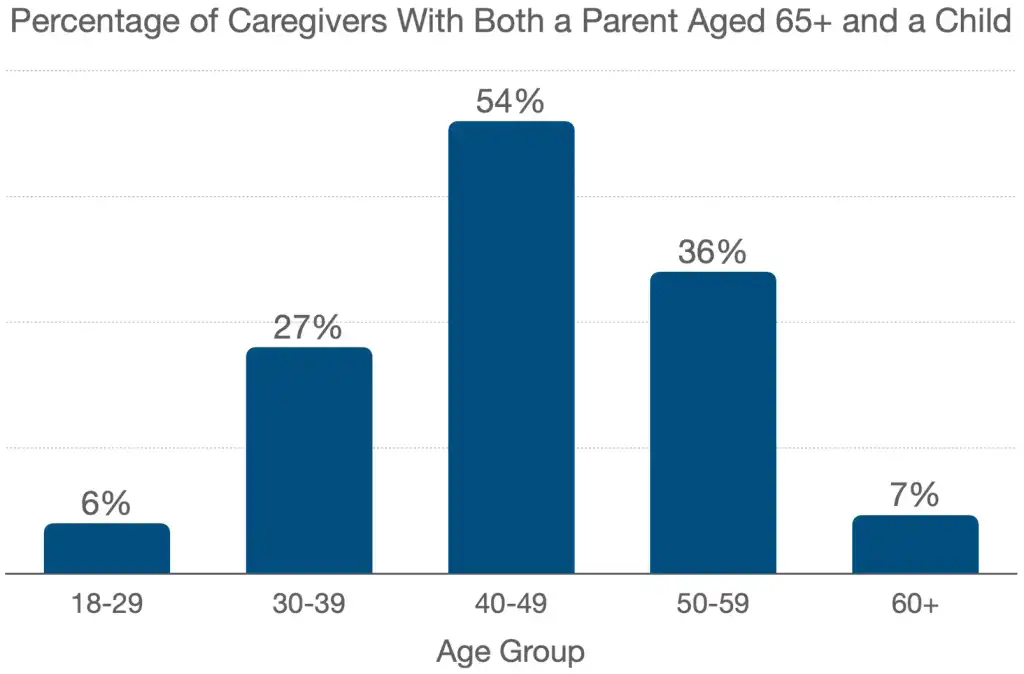
Sandwich Generation: The Double Duty of Gen X
The sandwich generation refers to people caring for both their children and aging parents. Many Gen X members fall into this category.
As lifespans lengthen and people start families later, more and more adults find themselves sandwiched between providing care for multiple generations of family members. This can add significant emotional, practical, and financial strain. According to a recent study published in the Journal of the American Geriatrics Society, around 24% of adults caring for a parent over 65 are also raising a child under 18.[1]
Who Comprises the Sandwich Generation?
While people across generations are part of this group, Gen Xers in their 40s and 50s are the most likely to be in the sandwich generation. Over half of adults in their 40s and 36% of those aged 50-59 have at least one living parent aged 65 or older and are supporting either minor children or financially helping grown children within the past year.[2]
Men and women are nearly equally likely to care for older parents and younger children in one way or another.[3] The same is true across racial and ethnic groups. Despite the difficult balancing act required, sandwich generation adults are likelier to report high satisfaction levels with their family life than other adults.[2]
Common Stressors Faced by Sandwich Generation Caregivers
Trying to adequately fill the role of caretaker and provider for two generations simultaneously comes with many challenges. Several of the most common stress points[4] include:
- Little to No Personal Time — Parenting children and caring for aging parents are each demanding responsibilities on their own. Finding time for yourself can feel impossible for sandwich generation caregivers attempting to do both. Maintaining work obligations compounds the time crunch further. It's critical for one's mental health to carve out pockets of personal time, even if they must be small. This can be accomplished through regular family meetings to delegate tasks and get on the same page about upcoming commitments. Don't hesitate to ask friends and neighbors for help when you need a short break.
- Family Discord — Providing elder care is often an emotionally fraught experience, even with the best family relationships. Role reversals and major transitions tend to intensify any existing tensions. Disagreements frequently emerge between siblings and relatives around issues like parental care decisions, financial responsibilities, and old disputes from the past resurfacing. Open communication is essential — be honest about your feelings and what you need from your family members. Compromise where possible and consider bringing in a mediator like a therapist or social worker for particularly tense conflicts.
- Complex Emotions — Though you may be your parent's caregiver now, you are still their child. Experiencing this role reversal directly can stir up powerful and confusing feelings. Anticipatory grief as you confront their mortality, loss of independence, guilt, resentment, and anger are all common emotional responses. Processing these emotions by sharing them with a trusted friend, counselor, or journal can provide relief. Make sure to attend to your own grieving process.
- Feeling Like a Failure — When juggling so many caretaking roles, it's impossible to live up to your own standards all the time. Sandwich generation caregivers often feel they're failing their children or parents because they can't do everything perfectly. Avoid black-and-white thinking — small mistakes don't equate to total failure. Acknowledge what you have accomplished amidst very taxing circumstances.
- Navigating Cultural Expectations — Certain cultural norms dictate caregiving for older parents as a given responsibility.[5] For those in this situation, resentment towards these obligations can build when work, friends, and other systems don't understand. Connecting with others from your culture who've likely had similar experiences can provide some comfort. And be sure to make time for relating to your parent just as their child, not only as their caregiver.
Financial and Emotional Impacts
Data reveals that sandwich generation caregivers face disproportionate financial and emotional burdens compared to adults only caring for older parents without minor children.
Financially, over one-third of sandwich generation caregivers report major difficulties.[5] They are also significantly more likely to experience emotional strain. However, they highlight the positive impacts of caregiving, such as feeling purposeful and fulfilled, and convey satisfaction with their family life.[2]
Sandwich generation caregivers are often employed in addition to their caretaking duties. Work obligations can be tricky when caregiving needs arise.[6] Flexibility policies often help in these situations.
There are also notable demographic differences[7] in the older adults reliant on sandwich generation caregivers compared to those cared for by non-sandwich caregivers. The parents of sandwich caregivers tend to be younger, in better health, more socially engaged through marriage, and less likely to live alone. Their care needs tend to be lighter at present. They also report having multiple caregivers compared to older adults cared for by single-generation caregivers.
Public Policy Considerations
The heavy caregiving demands and economic vulnerability of sandwich generation caregivers have important implications for employers and policymakers. Their labor and availability to provide in-home care significantly impact nursing home utilization and Medicaid spending on long-term care.
Considering declining birth rates, increased age of first-time parents, and smaller family sizes, this group's caregiving capacity is crucial for supporting the growing older adult population. Therefore, initiatives to aid working caregivers, like paid family leave and caregiver support programs, can help alleviate burnout. Employers can also do their part by extending flexible work arrangements.
Intergenerational Relationships
Along with the practical challenges of juggling childcare and eldercare, sandwich generation caregiving also shifts family dynamics across generations. However, most report positive impacts on intergenerational relationships.
A strong majority, around 75%, believe adult children are responsible for providing care and financial assistance to elderly parents in need. But only about half say parents have an obligation to support their grown children financially.
When aging parents require help with daily living activities or hands-on care, the majority of sandwich generation caregivers prefer to take on those responsibilities themselves. This often includes providing frequent emotional support as roles reverse and grown children become caretakers.
Despite the stresses, sandwich caregivers are moderately more likely to say they now have closer relationships with their adult children compared to the relationships they had with their own parents at the same life stage.[5]
Keys to Coping as a Sandwich Generation Caregiver
Trying to simultaneously meet the needs of children, aging loved ones, work, and your wellbeing is an immense challenge. Here are some tips to help cope with the unique demands:
- Ask for and accept help from others: friends, extended family, neighbors.
- Get other family members involved in caregiving and spending time with your aging parents.
- Maintain open and direct communication with family to set clear expectations.
- Take time for self-care through hobbies, socializing, exercise, and relaxing.
- Join a caregiver support group to find community and advice.
- Use available services like delivered meals and transportation.
- Be realistic about what you can achieve day to day as one person.
- Don't hesitate to speak to a therapist if you are experiencing anxiety, depression, excessive stress, or isolation.
While sandwich generation caregiving has difficulties, most find it rewarding and view it as a privilege to give back to those they love. With some added support and self-compassion, you can avoid burning out. The key is recognizing your limits and acknowledging that you cannot do everything perfectly.
Practical Strategies for Managing Competing Demands
Sandwich generation caregivers wear many hats: parent, child, caregiver, spouse, employee, and more. With so many responsibilities competing for time and energy, it's essential to get organized and work efficiently.
- Schedule Regular Respite Time — Make respite, or short breaks, a priority by putting them on your calendar. This could be going out to dinner with your spouse once a week or getting together with friends twice a month. Don't cancel these commitments when other demands creep up. You need guilt-free time for yourself to recharge.
- Share the Caregiving with Siblings — If possible, involve siblings and other family members directly in caregiving tasks. Discuss everyone's availability and abilities to share duties like taking your parent to appointments, preparing meals, managing medications, providing transportation, and more hands-on help.
- Explore Paid Help — Investigate hiring outside assistance if you can afford it. Many communities have home care agencies that provide caregivers for light housekeeping, meal prep, companionship, and more involved personal care. Adult day programs offer socialization and activities for seniors during work hours. Respite programs provide in-home supervision for short periods.
- Use Time-Saving Technology — Take advantage of technology to help coordinate caregiving and stay on top of your parent's needs. Shareable online calendars allow you to sync schedules with siblings and other helpers. Medication reminders and dispensers help your parent comply with treatment. Video check-ins let you visually monitor their wellbeing and mobility. Voice-activated speakers make it easy for them to ask questions, set reminders, and more.
- Communicate Needs Clearly at Work — If employed, communicate your caregiving situation clearly with your manager and HR department. Discuss what flexible arrangements could help, like flex hours, working remotely, or condensed schedules. Understand what leave benefits you have access to, like FMLA. Don't be afraid to advocate for accommodations that will allow you to maintain your performance.
- Research Local Resources — Your Area Agency on Aging is a government-designated organization in every community providing resources for older adults and caregivers. They have information on services like transportation, meal programs, support groups, respite care, legal help, and financial assistance. Many faith-based groups and non-profits also provide helpful services to aid seniors and caregivers.
- Focus on Small Daily Goals — On stressful days, narrow your focus to achieving 1-2 main caregiving tasks. It could be getting your parent to a doctor's visit safely or preparing a week's worth of meals for them that day. Don't get discouraged by what you didn't cross off your enormous to-do list. Celebrate accomplishing your small daily goals amidst challenging circumstances.
- Prioritize Healthy Stress Management — Don't neglect your health and wellbeing. Make stress management a priority through sufficient sleep, a healthy diet, regular exercise, and social connections. If anxiety or depression[8] starts impacting daily function, seek counseling. Support groups connect you with fellow caregivers who understand the challenges you face. Reframe situations positively — you are providing meaningful assistance to loved ones.
- Create a Caregiver Contract — Formalize arrangements with specific family members about caregiving responsibilities through a written contract. Outline each person's contribution, whether it's hands-on care, financial assistance, or simply visiting regularly. Make sure everyone consents and commits. Update it as needs change. This provides helpful structure and accountability.
Conclusion
In conclusion, being part of the sandwich generation and trying to balance caring for aging parents and young children poses significant challenges. The practical demands and complex emotions involved can take a toll financially, physically, and mentally. However, with some thoughtful planning, sharing care tasks, utilizing resources, and practicing self-care, it is possible to cope with the responsibilities.
While undoubtedly difficult at times, most sandwich generation caregivers find meaning in supporting multiple generations of family. Focusing on the positives, like deepening intergenerational bonds, can motivate during stressful periods. With an organized approach and willingness to ask for help when needed, sandwich generation caregivers can avoid burnout. Most importantly, remember that perfection is unattainable with so many competing obligations. Be kind to yourself when you fall short of ideal standards on any given day.

